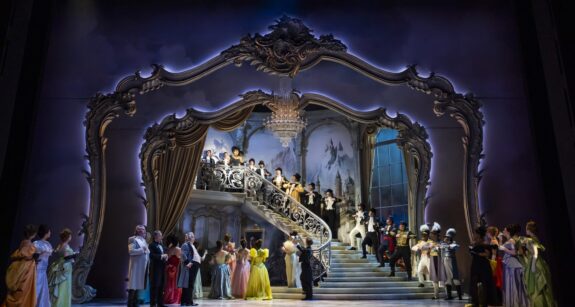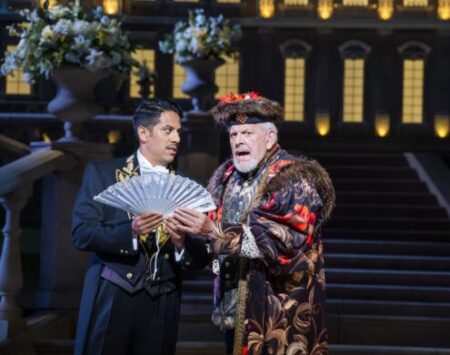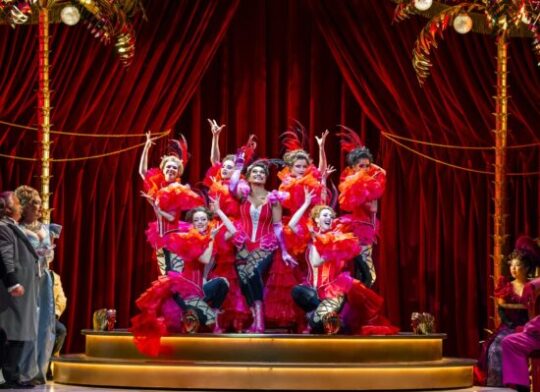 United Kingdom Franz Lehár’s The Merry Widow: Soloists, The Glyndebourne Chorus, London Philharmonic Orchestra / John Wilson (conductor). Filmed (directed by Rhodri Huw) at the Glyndebourne Opera House and broadcast on BBC Four on 25.12.2024 and available on iPlayer. (JPr)
United Kingdom Franz Lehár’s The Merry Widow: Soloists, The Glyndebourne Chorus, London Philharmonic Orchestra / John Wilson (conductor). Filmed (directed by Rhodri Huw) at the Glyndebourne Opera House and broadcast on BBC Four on 25.12.2024 and available on iPlayer. (JPr)

Just a little bit of background first about The Merry Widow: it is based on Henri Meilhac’s 1861 French comedy L’attaché d’ambassade (The Embassy Attaché). The play has Baron Scharpf, the Parisian ambassador of an impoverished German duchy, needing to arrange a marriage between his country’s richest widow, Madeline von Palmer, and embassy attaché Count Prachs to stave off economic disaster in their homeland. The original Paris production at the Théâtre du Vaudeville lasted only 15 performances though a German adaptation (Der Gesandschafts-Attaché) was received better and revived from time to time. In early 1905 it came to the attention of librettist Leo Stein who considered it could be the source of a successful operetta, and he took it to his occasional collaborator Victor Léon.
Vienna’s Theater an der Wien had not had a great hit for some time and theatre manager Wilhelm Karczag was looking for something new with a Parisian setting, and a musical version of Der Gesandschafts–Attaché sounded like a good idea. Short of funds the management kept their investment in Die lustige Witwe, as the operetta was now called, to a minimum by reusing old sets and costumes. Attributing it to Meilhac’s original play would have meant paying rights fees so it was originally described as ‘partly based on a foreign source’. The second-hand production had a first-rate cast however. Veteran operetta performers, Mizzi Günther and Louis Treumann were Hanna Glawari and her once and future lover, Count Danilo. Like the composer, the two stars firmly believed Die lustige Witwe would succeed. Indeed, Treumann went as far as ordering a costly replica of a real prince’s dress uniform for himself. He was Crown Prince Danilo of Montenegro who had inspired his character’s name and whose country had been the model for the impoverished Balkan state the librettists renamed ‘Pontevedro’.
Die lustige Witwe did eventually premiere on 30 December 1905 and was a great success. Gustav and Alma Mahler enjoyed it, and she reminisces that after they saw it the first time, they ‘danced together when we got home and played Lehár’s waltz from memory; but the exact passage defied our utmost efforts’. Claiming they were too ‘highbrow’ to buy the actual music they went to a famous music shop in Vienna and while Mahler asked about the sale of his compositions Alma ‘turned the pages of the various piano editions of The Merry Widow and found the passage I wanted. I sang it as soon as we were in the street in case it slipped my memory a second time.’
Undoubtedly operetta can be an old-fashioned evening, but it can also be a diversion from real life by drawing you into a fantasy world of romantic comedy and stealing your heart away. I have memorably seen operetta at the Vienna Volksoper and many years ago with English National Opera (in their golden years) and how much had the creative team behind this Merry Widow actually seen and heard, I wonder? To be performed correctly it needs sufficient artists of considerable acting skills, personal charisma and vocal beauty to bring these hackneyed yet well-loved old tunes to life. The mix – and definitely the tone – was just not completely right here. As given its first ever performances by Glyndebourne Festival Opera it would have had Gustav and Alma Mahler spinning in their Grinzing graves rather than waltzing.
John Wilson’s pre-eminence in ‘lighter music’ is well-known and – when let off the leash by director Cal McCrystal – his conducting of the exemplary-sounding London Philharmonic Orchestra seemed to be overemphasising the music rather too much. In operetta, the words being sung tell the story and the music just underlines the emotional atmosphere. Here unnecessarily grand statements appeared to be attempted and there was too little of the genuine Viennese schwung I have experienced in other performances. Nevertheless ‘You’ll Find me Chez Maxim’s’, ‘Vilja Song’ (complement by a small onstage band), ‘Merry Widow Waltz’ and the ‘Can-Can’ all made considerable impact.
Glyndebourne’s Merry Widow is (freely) adapted from the original libretto by Stephen Plaice and Marcia Bellamy who have turned it into a musical pantomime as true to Leon and Stein as any Christmas Peter Pan is to J. M. Barrie’s original play, which is not much. It looks like no expense has been spare getting it to the Glyndebourne stage. Designer Gary McCann’s Belle Époque ballroom for the Pontevedrian Embassy is gilded and purplish with false proscenium arches and a huge, curved staircase at its centre down which Danilo spectacularly tumbles for his first entrance and later Hanna sweeps down from top to bottom passing the male chorus often in top hats and tails lined up on it. Indeed, the costumes are glamorous throughout this Merry Widow for the men and the women. There is a distinct Golden Age of Broadway – and even Hollywood – to what we see. Indeed, it resembled the Marx Brothers’ opening scene in their 1933 Duck Soup, the basic premise of which also involves a bankrupt state and a dowager millionairess.
Sadly, the humour now is more that of 1970s and 80s sitcoms, end-of-the pier variety shows or pantos than Marx Brothers’ wit. McCrystal has a good track record with Gilbert and Sullivan at ENO, Rossini at Garsington, One Man, Two Guvnors in the West End and much else. However together with the adapters of this Merry Widow they seem to be fans of the Carry On films and The Play That Goes Wrong. Wit is often replaced by several ho-hum jokes, innuendo and much slapstick humour. There is also some breaking of the fourth wall in a Frankie Howerd ‘Oh, please yourself, then’-type of way. Soon after the start when a joke falls flat Sir Thomas Allen’s Baron Zita turns to the audience and remarks they are a ‘Tough crowd’. Not long after Tom Edden’s almost ever-present, tiresome Njegus, the ambassador’s secretary, get an unnecessary – woeful and extended – joke about the confusion between the name ‘Yvette’ and ‘a vet’ before commenting on some overacting by Michael Wallace as Kromov by exclaiming ‘He’s got his agent in!’ As for innuendo even the Carry Ons might have thought twice about Melissa Gregory’s Praskovia commenting about Soraya Mafi’s Valencienne ‘That woman spreads her fan for anyone.’
The song lyrics are not much better and rely on rhymes like those of Sir Tim Rice at his best (!) with an early assignation between the Camille de Rosillon (Michael McDermott) and Valencienne (Baron Zita’s wife) being a good example: (Valencienne) ‘We can’t put off this conversation.’ / (Camille) ‘I’ve spent all day in anticipation.’ At this point Camille spins her around and she twirls straight into the wings. This couple of illicit lovers get most of The Play That Goes Wrong moments. In the second act Camille struggles to pull a rose from a trellis and then steps on Valencienne’s dress before they indicate the pavilion where they will have their romantic encounter by pointing one way while it is pushed on from the other side of the stage. There follows much acrobatic shadowplay involving a blowup sex doll which is funny in its way but rather inappropriate for such a magnificent work as Merry Widow. Camille is the image of René Artois the central character of the 1980s BBC sitcom ‘Allo ‘Allo! and both he and Valencienne have dodgy French accents recognisable from that show.
For Act II we look to be at the rear of Hanna’s house, though calling it that is an insult because we could be in the gardens of Versailles with the palace in the background with a staircase down from an upper level. We learn that Hanna has ended her year of mourning and appears to be celebrating that in the grandest style. Ostensibly it is marking the Pontevedrian Grand Duke’s birthday, whose portrait in Act I looked suspiciously like Gus Christie, Glyndebourne’s executive chairman and husband of Danielle de Niese singing Hanna. There are flamboyant costumes, repeated ‘Tra-la-la-la-la-la-la’-ing and much dancing especially by Hanna whom choreographer Carrie-Anne Ingrouille never allows to stand still. Danilo refuses to do his duty and marry Hanna who he had a relationship with when they were much younger, because he says, ‘I’ll do anything for my country except marry’ and in the next act ‘I won’t exchange love for money’. Hanna in fact agrees to marry Camille to save Valencienne from dishonour making out it was her in the pavilion making out.
Maxim’s is a riot of red and it is Hanna here and not Valencienne who entertains the crowd along with six can-canning grisettes. Njegus is usually a non-singing role (and shame it wasn’t here too) but he gets a frantic routine with the grisettes which is repeated twice (why?) and sings about being ‘a gay Parisienne’. Hanna knows Danilo still loves her and a happy ending is assured. Hanna reveals that on remarrying she loses her entire fortune but ‘it all goes to my new husband’ and so the money will stay in Pontevedro. With a dig at the beleaguered ENO, it is suggested they could build an opera house (the Pontevedrian National Opera’ though – at another pointed reference to Glyndebourne – Hanna (or chatelaine Danielle de Niese) suggests ‘Just don’t put the theatre too near the house!’

I think Lehár’s The Merry Widow has much more depth to it and doesn’t deserve to be just a light-hearted farce. Consequently, Danielle de Niese didn’t appear be entirely right for Hanna Glawari; she is an impeccable light-comedian but perhaps there should have been more world-weariness and possibly cynicism about love and loss. De Niese’s soprano voice – rich in nuance and colours – improved as this Merry Widow went on but was frequently too ‘operatic’. Her Danilo was baritone Germán Olvera, who, for me, was the only one of the cast to capture the true essence of the vocal style needed for an operetta like this. (He reminded me so much of Desi Arnaz of I Love Lucy, if you remember him.) In a fine ensemble of soloists, chorus and dancers, lovers Soraya Mafi (Valencienne) and Michael McDermott (Camille) sang delightfully and impassively endured all the indignities Cal McCrystal foisted on them. I believe Sir Thomas Allen held off retiring from opera to appear as Baron Zita before stepping away immediately after the run of performances last July. I first saw him sing 50 years ago (help!) as Demetrius in Britten’s A Midsummer Night’s Dream. Allen had great fun as the harassed– and occasionally confused – Ambassador and it was a fitting way to bring the curtain down on such an illustrious career.
Jim Pritchard
Featured Image: Danielle de Niese (Hanna Glawari) and dancers in The Merry Widow Act III © Tristram Kenton
Creatives:
Librettist – Viktor Leon and Leo Stein
Book and Lyrics – Stephen Plaice
Lyrics and Vocal setting – Marcia Bellamy
Director – Cal McCrystal
Designer – Gary McCann
Lighting Designer – Ben Cracknell
Choreographer – Carrie-Anne Ingrouille
Chorus director – Aidan Oliver
Cast:
Vicomte Cascada – Alex Otterburn
Baron Mirko Zeta – Thomas Allen
Raoul de St Brioche – Innocent Masuku
Kromov – Michael Wallace
Valencienne – Soraya Mafi
Comte Camille de Rosillon – Michael McDermott
Njegus – Tom Edden
Bogdanovitsch – Adam Marsden
Pritschitsch – John Mackenzie-Lavansch
Hanna Glawari – Danielle de Niese
Praskovia – Melissa Gregory
Sylviana – Emily Hodkinson
Olga – Rachel Taylor
Count Danilo Danilovitsch – Germán Olvera
Dancers – Erin Baig, Wednesday Houghton, Jaide Jeffrey, Phoebe Jones, Helen Rose Katie Whitcombe
